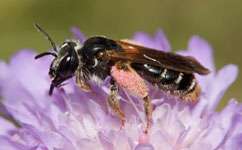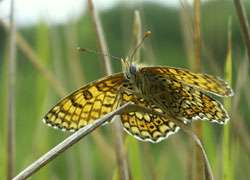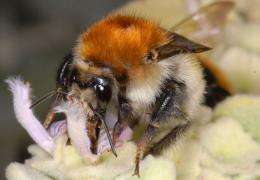Efforts to conserve biodiversity in the UK, Belgium and Netherlands may be working, despite the widespread perception that wildlife is in terminal decline, a new study suggests.
It's often suggested that we've failed abjectly to meet the 1992 Rio Earth Summit's goal of slowing biodiversity loss by 2010. But taking a longer historical perspective shows that after plummeting for several decades, biodiversity has shown signs of improvement since 1990. The report's authors say conservation efforts and wildlife-friendly farming methods are a plausible explanation.
They looked at historical data on the diversity of plants and pollinating insects in the UK, Belgium and the Netherlands. Their results show that in the UK from the 1950s to 1980s, bumblebees, butterflies and wild plants were all becoming less varied and diverse, while hoverflies and solitary bees were holding steady.
Since 1990, most of those trends have improved. Wild plants have stopped their decline and bumblebees are declining more slowly - around a ten per cent drop in UK species diversity, compared to 30 per cent from 1950 to 1980.
Hoverflies are still stable and solitary bee diversity seems to be increasing - it's up 10 per cent over the last two decades in the UK, and 7 per cent in the Netherlands.
Glanville fritillary.
This may well be because of greater efforts to conserve wildlife, seen in the uptake of agri-environmental schemes under which farmers are paid to do things like leaving field margins uncultivated to provide wildlife habitat. During the mid-twentieth century, the emphasis was on getting as much land under cultivation as possible; in the 1990s, this trend started to be reversed, with growing interest in wildlife protection and less indiscriminate use of pesticides and fertilisers. It may be that we're only now starting to see the benefits of that shift.
'It's certainly a coherent explanation of the trends we found,' says Professor Bill Kunin, an ecologist at the University of Leeds and one of the paper's authors. 'There's been a huge increase in the amount of societal effort that goes into conservation, particularly in the farmed environment.' He notes that other researchers looking at much smaller scales have found evidence suggesting that farms taking part in agri-environment schemes do seem to be more diverse.
'Our work suggests that the resources society has spent on this have not been wasted,' Kunin adds. He argues that over the next few years as European Union farm subsidies are renegotiated, it's important to emphasise the benefits that have come from the agri-environment schemes they fund, to prevent them being cut. 'If society thinks it is wasting money by paying for these things, society will stop paying for them,' he says.
The picture isn't entirely hopeful. Butterflies are still declining as quickly as ever in all three countries, for reasons that are still unclear. 'It is possible that by 1990 the most sensitive species had already gone,' says Dr Luisa Carvalheiro, lead author of the paper. 'However, that's probably not the whole story, as there are still plenty of rare and vulnerable species present in recent records.'
And although the local diversity of species seems to have stabilised, the wildlife landscape has less geographically varied. This trend of 'biotic homogenisation' was particularly evident in Belgium and the Netherlands, where the differences between the living things found in different areas have been almost completely erased. Something similar happened in the UK, but since 1990 some of its geographical variation seems to have returned.
Many of the species the scientists looked at play important roles in the wider ecosystem, particularly by pollinating plants – without them, many crops would be impossible to grow.
The paper appears in Ecology Letters. It was mainly EU-funded but drew on data provided by bodies across Europe including the UK Biological Records Centre. Further support came from the UK Insect Pollinators Initiative.
More information: Carvalheiro, L. et al. Species richness declines and biotic homogenization have slowed down for NW-European pollinators and plants, Ecology Letters, doi: 10.1111/ele.12121
Journal information: Ecology Letters
Provided by PlanetEarth Online
This story is republished courtesy of Planet Earth online, a free, companion website to the award-winning magazine Planet Earth published and funded by the Natural Environment Research Council (NERC).
























